
DelphiOpenAI
OpenAI API wrapper for Delphi. Use ChatGPT, DALL-E, Whisper and other products.
Stars: 225
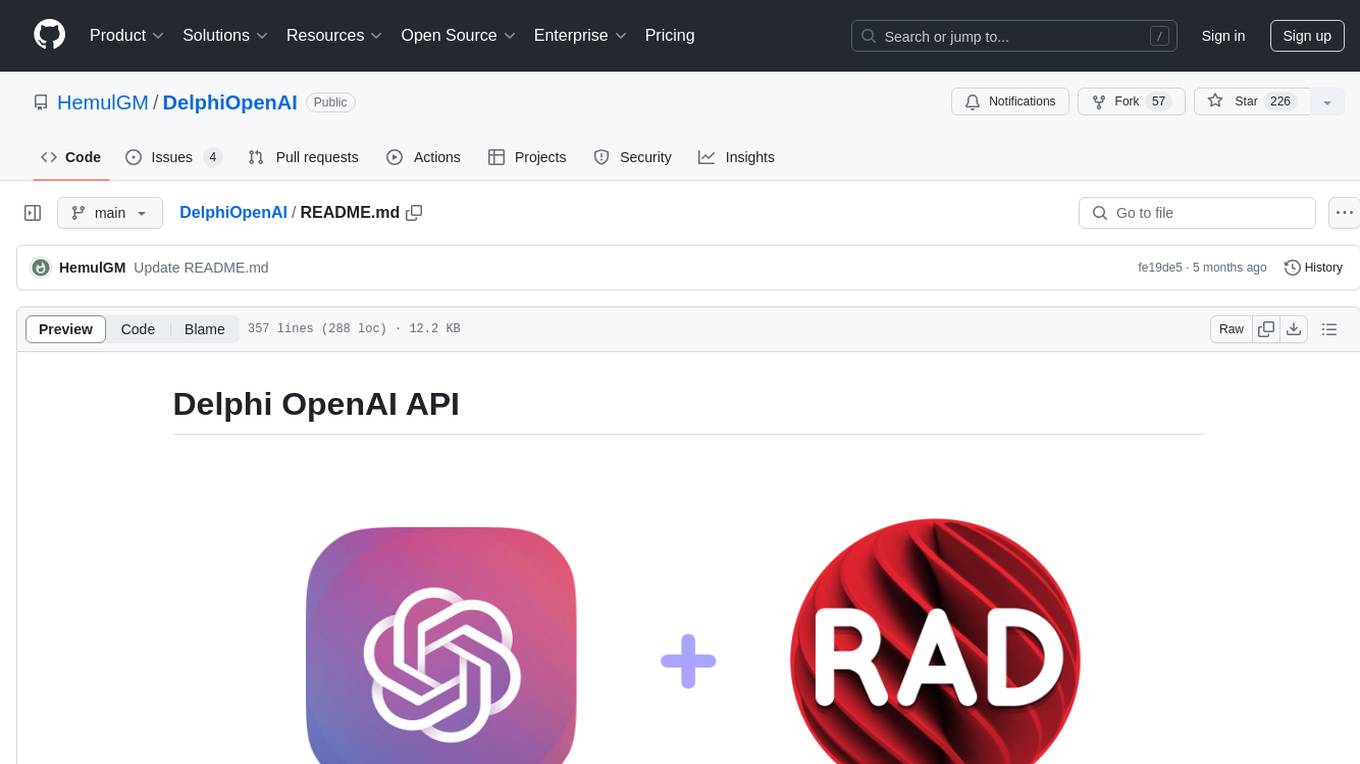
Delphi OpenAI API is an unofficial library providing Delphi implementation over OpenAI public API. It allows users to access various models, make completions, chat conversations, generate images, and call functions using OpenAI service. The library aims to facilitate tasks such as content generation, semantic search, and classification through AI models. Users can fine-tune models, work with natural language processing, and apply reinforcement learning methods for diverse applications.
README:
This repositorty contains Delphi implementation over OpenAI public API.
❗This is an unofficial library. OpenAI does not provide any official library for Delphi.
Coverage
| API | Status |
|---|---|
| Models | 🟢 Done |
| Completions (Legacy) | 🟢 Done |
| Chat | 🟢 Done |
| Chat Vision | 🟢 Done |
| Edits | 🟢 Done |
| Images | 🟢 Done |
| Embeddings | 🟢 Done |
| Audio | 🟢 Done |
| Files | 🟢 Done |
| Fine-tunes (Depricated) | 🟢 Done |
| Fine-tuning | 🟢 Done |
| Moderations | 🟢 Done |
| Engines (Depricated) | 🟢 Done |
| Assistants | 🟠 In progress |
| Threads | 🟠 In progress |
| Messages | 🟠 In progress |
| Runs | 🟠 In progress |
OpenAI is a non-profit artificial intelligence research organization founded in San Francisco, California in 2015. It was created with the purpose of advancing digital intelligence in ways that benefit humanity as a whole and promote societal progress. The organization strives to develop AI (Artificial Intelligence) programs and systems that can think, act and adapt quickly on their own – autonomously. OpenAI's mission is to ensure safe and responsible use of AI for civic good, economic growth and other public benefits; this includes cutting-edge research into important topics such as general AI safety, natural language processing, applied reinforcement learning methods, machine vision algorithms etc.
The OpenAI API can be applied to virtually any task that involves understanding or generating natural language or code. We offer a spectrum of models with different levels of power suitable for different tasks, as well as the ability to fine-tune your own custom models. These models can be used for everything from content generation to semantic search and classification.
This library provides access to the API of the OpenAI service, on the basis of which ChatGPT works and, for example, the generation of images from text using DALL-E.
You can install the package from GetIt directly in the IDE. Or, to use the library, just add the root folder to the IDE library path, or your project source path.
To initialize API instance you need to obtain API token from your Open AI organization.
Once you have a token, you can initialize TOpenAI class, which is an entry point to the API.
Due to the fact that there can be many parameters and not all of them are required, they are configured using an anonymous function.
uses OpenAI;
var OpenAI := TOpenAIComponent.Create(Self, API_TOKEN);or
uses OpenAI;
var OpenAI: IOpenAI := TOpenAI.Create(API_TOKEN);Once token you posses the token, and the instance is initialized you are ready to make requests.
List and describe the various models available in the API. You can refer to the Models documentation to understand what models are available and the differences between them.
var Models := OpenAI.Model.List();
try
for var Model in Models.Data do
MemoChat.Lines.Add(Model.Id);
finally
Models.Free;
end;Review Models Documentation for more info.
Given a prompt, the model will return one or more predicted completions, and can also return the probabilities of alternative tokens at each position.
var Completions := OpenAI.Completion.Create(
procedure(Params: TCompletionParams)
begin
Params.Prompt(MemoPrompt.Text);
Params.MaxTokens(2048);
end);
try
for var Choice in Completions.Choices do
MemoChat.Lines.Add(Choice.Index.ToString + ' ' + Choice.Text);
finally
Completions.Free;
end;Review Completions Documentation for more info.
Given a chat conversation, the model will return a chat completion response. ChatGPT is powered by gpt-3.5-turbo, OpenAI’s most advanced language model.
Using the OpenAI API, you can build your own applications with gpt-3.5-turbo to do things like:
- Draft an email or other piece of writing
- Write Python code
- Answer questions about a set of documents
- Create conversational agents
- Give your software a natural language interface
- Tutor in a range of subjects
- Translate languages
- Simulate characters for video games and much more
This guide explains how to make an API call for chat-based language models and shares tips for getting good results.
var Chat := OpenAI.Chat.Create(
procedure(Params: TChatParams)
begin
Params.Messages([TChatMessageBuild.Create(TMessageRole.User, Text)]);
Params.MaxTokens(1024);
end);
try
for var Choice in Chat.Choices do
MemoChat.Lines.Add(Choice.Message.Content);
finally
Chat.Free;
end;OpenAI.Chat.CreateStream(
procedure(Params: TChatParams)
begin
Params.Messages([TchatMessageBuild.User(Buf.Text)]);
Params.MaxTokens(1024);
Params.Stream;
end,
procedure(Chat: TChat; IsDone: Boolean; var Cancel: Boolean)
begin
if (not IsDone) and Assigned(Chat) then
Writeln(Chat.Choices[0].Delta.Content)
else if IsDone then
Writeln('DONE!');
Writeln('-------');
Sleep(100);
end);var Chat := OpenAI.Chat.Create(
procedure(Params: TChatParams)
begin
Params.Model('gpt-4-vision-preview');
var Content: TArray<TMessageContent>;
Content := Content + [TMessageContent.CreateText(Text)];
Content := Content + [TMessageContent.CreateImage(FileToBase64('file path'))];
Params.Messages([TChatMessageBuild.User(Content)]);
Params.MaxTokens(1024);
end);
try
for var Choice in Chat.Choices do
MemoChat.Lines.Add(Choice.Message.Content);
finally
Chat.Free;
end;Review Chat Documentation for more info.
Given a prompt and/or an input image, the model will generate a new image.
var Images := OpenAI.Image.Create(
procedure(Params: TImageCreateParams)
begin
Params.Prompt(MemoPrompt.Text);
Params.ResponseFormat('url');
end);
try
for var Image in Images.Data do
Image1.Bitmap.LoadFromUrl(Image.Url);
finally
Images.Free;
end;Review Images Documentation for more info.
In an API call, you can describe functions to gpt-3.5-turbo-0613 and gpt-4-0613, and have the model intelligently choose to output a JSON object containing arguments to call those functions. The Chat Completions API does not call the function; instead, the model generates JSON that you can use to call the function in your code.
The latest models (gpt-3.5-turbo-0613 and gpt-4-0613) have been fine-tuned to both detect when a function should to be called (depending on the input) and to respond with JSON that adheres to the function signature. With this capability also comes potential risks. We strongly recommend building in user confirmation flows before taking actions that impact the world on behalf of users (sending an email, posting something online, making a purchase, etc).
var Chat := OpenAI.Chat.Create(
procedure(Params: TChatParams)
begin
Params.Functions(Funcs); //list of functions (TArray<IChatFunction>)
Params.FunctionCall(TFunctionCall.Auto);
Params.Messages([TChatMessageBuild.User(Text)]);
Params.MaxTokens(1024);
end);
try
for var Choice in Chat.Choices do
if Choice.FinishReason = TFinishReason.FunctionCall then
ProcFunction(Choice.Message.FunctionCall) // execute function (send result to chat, and continue)
else
MemoChat.Lines.Add(Choice.Message.Content);
finally
Chat.Free;
end;
...
procedure ProcFunction(Func: TChatFunctionCall);
begin
var FuncResult := Execute(Func.Name, Func.Arguments); //execute function and get result (json)
var Chat := OpenAI.Chat.Create(
procedure(Params: TChatParams)
begin
Params.Functions(Funcs); //list of functions (TArray<IChatFunction>)
Params.FunctionCall(TFunctionCall.Auto);
Params.Messages([ //need all history
TChatMessageBuild.User(Text),
TChatMessageBuild.NewAsistantFunc(Func.Name, Func.Arguments),
TChatMessageBuild.Func(FuncResult, Func.Name)]);
Params.MaxTokens(1024);
end);
try
for var Choice in Chat.Choices do
MemoChat.Lines.Add(Choice.Message.Content);
finally
Chat.Free;
end;
end;Review Functions Documentation for more info.
try
var Images := OpenAI.Image.Create(...);
except
on E: OpenAIExceptionRateLimitError do
ShowError('OpenAI Limit Error: ' + E.Message);
on E: OpenAIException do
ShowError('OpenAI Error: ' + E.Message);
end;- OpenAIExceptionAPI - errors of wrapper
- OpenAIException - base exception
- OpenAIExceptionInvalidRequestError
- OpenAIExceptionRateLimitError
- OpenAIExceptionAuthenticationError
- OpenAIExceptionPermissionError
- OpenAIExceptionTryAgain
- OpenAIExceptionInvalidResponse - parse error
OpenAI.API.Client.ProxySettings := TProxySettings.Create(ProxyHost, ProxyPort, ProxyUserName, ProxyPassword);This library does not require any 3rd party library. It works on recent Delphi versions (10.3+). Althought not fully tested, it should also work on all supported platforms (Windows, Linux, macOS, Android, iOS).
Since the library requires your secret API key, it's not recommended you use it on client applications, as your secret key will be exposed, unless you are sure about the security risks.
MIT License
Copyright (c) 2023 HemulGM
Permission is hereby granted, free of charge, to any person obtaining a copy
of this software and associated documentation files (the "Software"), to deal
in the Software without restriction, including without limitation the rights
to use, copy, modify, merge, publish, distribute, sublicense, and/or sell
copies of the Software, and to permit persons to whom the Software is
furnished to do so, subject to the following conditions:
The above copyright notice and this permission notice shall be included in all
copies or substantial portions of the Software.
THE SOFTWARE IS PROVIDED "AS IS", WITHOUT WARRANTY OF ANY KIND, EXPRESS OR
IMPLIED, INCLUDING BUT NOT LIMITED TO THE WARRANTIES OF MERCHANTABILITY,
FITNESS FOR A PARTICULAR PURPOSE AND NONINFRINGEMENT. IN NO EVENT SHALL THE
AUTHORS OR COPYRIGHT HOLDERS BE LIABLE FOR ANY CLAIM, DAMAGES OR OTHER
LIABILITY, WHETHER IN AN ACTION OF CONTRACT, TORT OR OTHERWISE, ARISING FROM,
OUT OF OR IN CONNECTION WITH THE SOFTWARE OR THE USE OR OTHER DEALINGS IN THE
SOFTWARE.
For Tasks:
Click tags to check more tools for each tasksFor Jobs:
Alternative AI tools for DelphiOpenAI
Similar Open Source Tools

DelphiOpenAI
Delphi OpenAI API is an unofficial library providing Delphi implementation over OpenAI public API. It allows users to access various models, make completions, chat conversations, generate images, and call functions using OpenAI service. The library aims to facilitate tasks such as content generation, semantic search, and classification through AI models. Users can fine-tune models, work with natural language processing, and apply reinforcement learning methods for diverse applications.
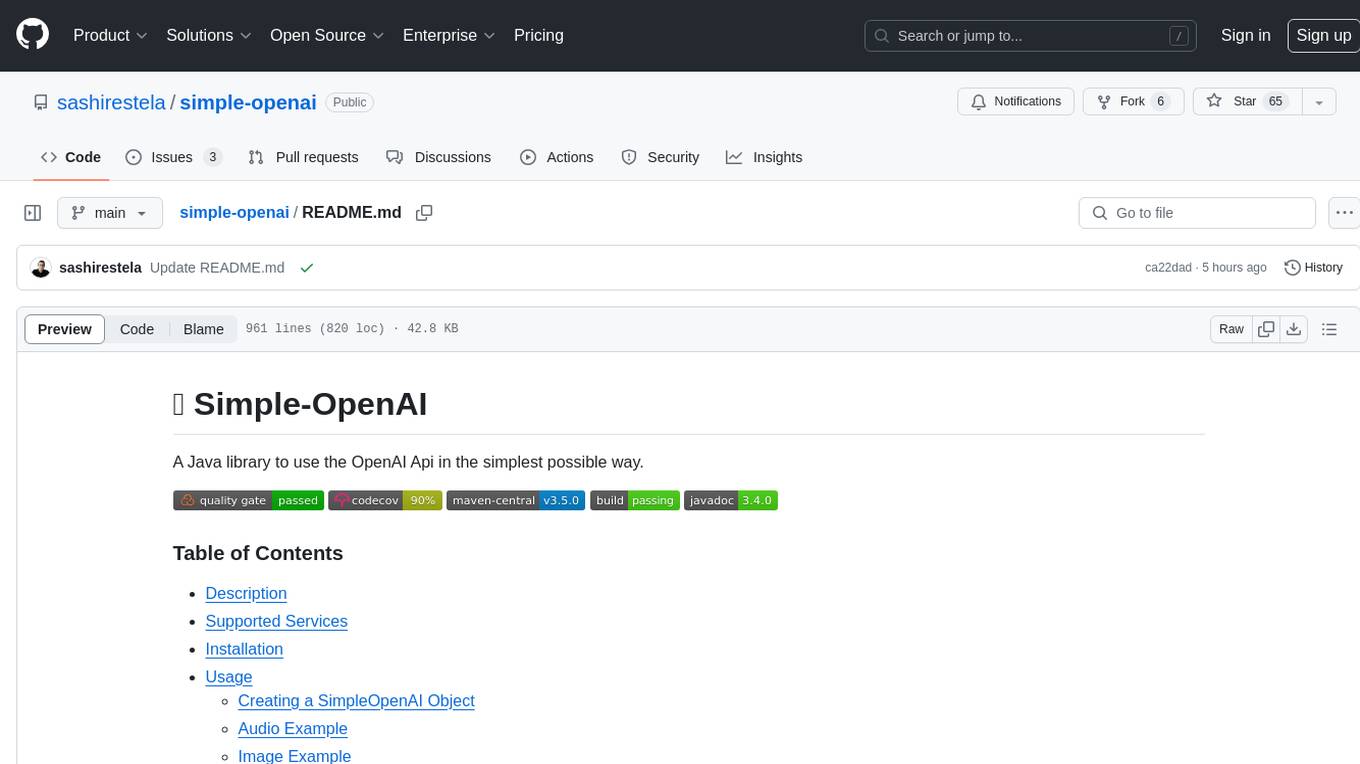
simple-openai
Simple-OpenAI is a Java library that provides a simple way to interact with the OpenAI API. It offers consistent interfaces for various OpenAI services like Audio, Chat Completion, Image Generation, and more. The library uses CleverClient for HTTP communication, Jackson for JSON parsing, and Lombok to reduce boilerplate code. It supports asynchronous requests and provides methods for synchronous calls as well. Users can easily create objects to communicate with the OpenAI API and perform tasks like text-to-speech, transcription, image generation, and chat completions.
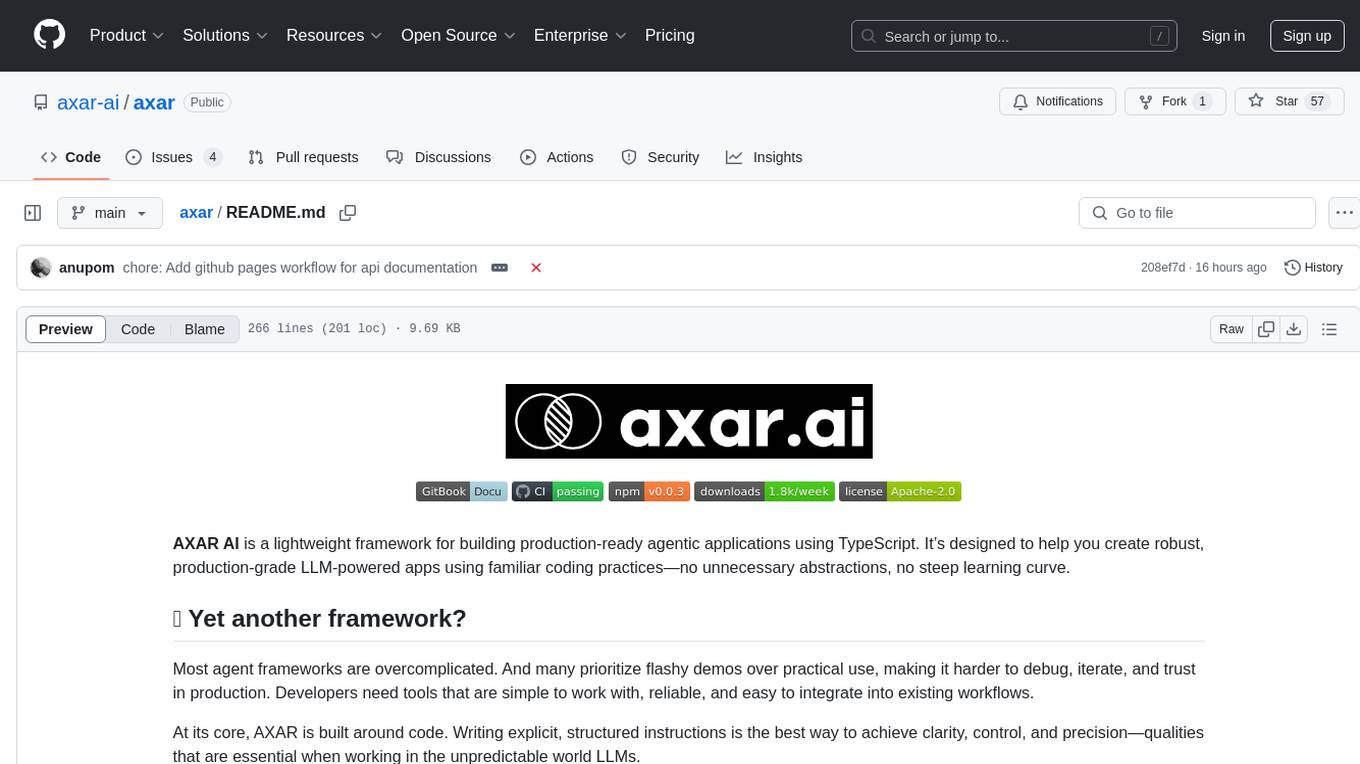
axar
AXAR AI is a lightweight framework designed for building production-ready agentic applications using TypeScript. It aims to simplify the process of creating robust, production-grade LLM-powered apps by focusing on familiar coding practices without unnecessary abstractions or steep learning curves. The framework provides structured, typed inputs and outputs, familiar and intuitive patterns like dependency injection and decorators, explicit control over agent behavior, real-time logging and monitoring tools, minimalistic design with little overhead, model agnostic compatibility with various AI models, and streamed outputs for fast and accurate results. AXAR AI is ideal for developers working on real-world AI applications who want a tool that gets out of the way and allows them to focus on shipping reliable software.
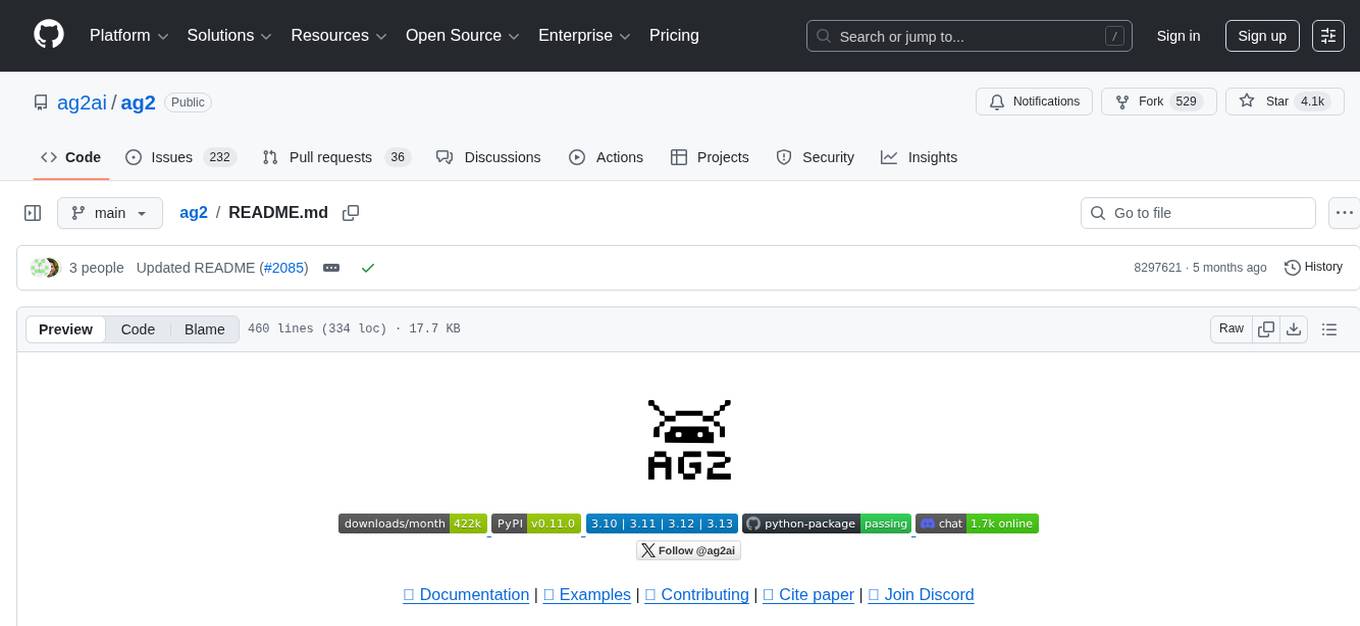
ag2
Ag2 is a lightweight and efficient tool for generating automated reports from data sources. It simplifies the process of creating reports by allowing users to define templates and automate the data extraction and formatting. With Ag2, users can easily generate reports in various formats such as PDF, Excel, and CSV, saving time and effort in manual report generation tasks.
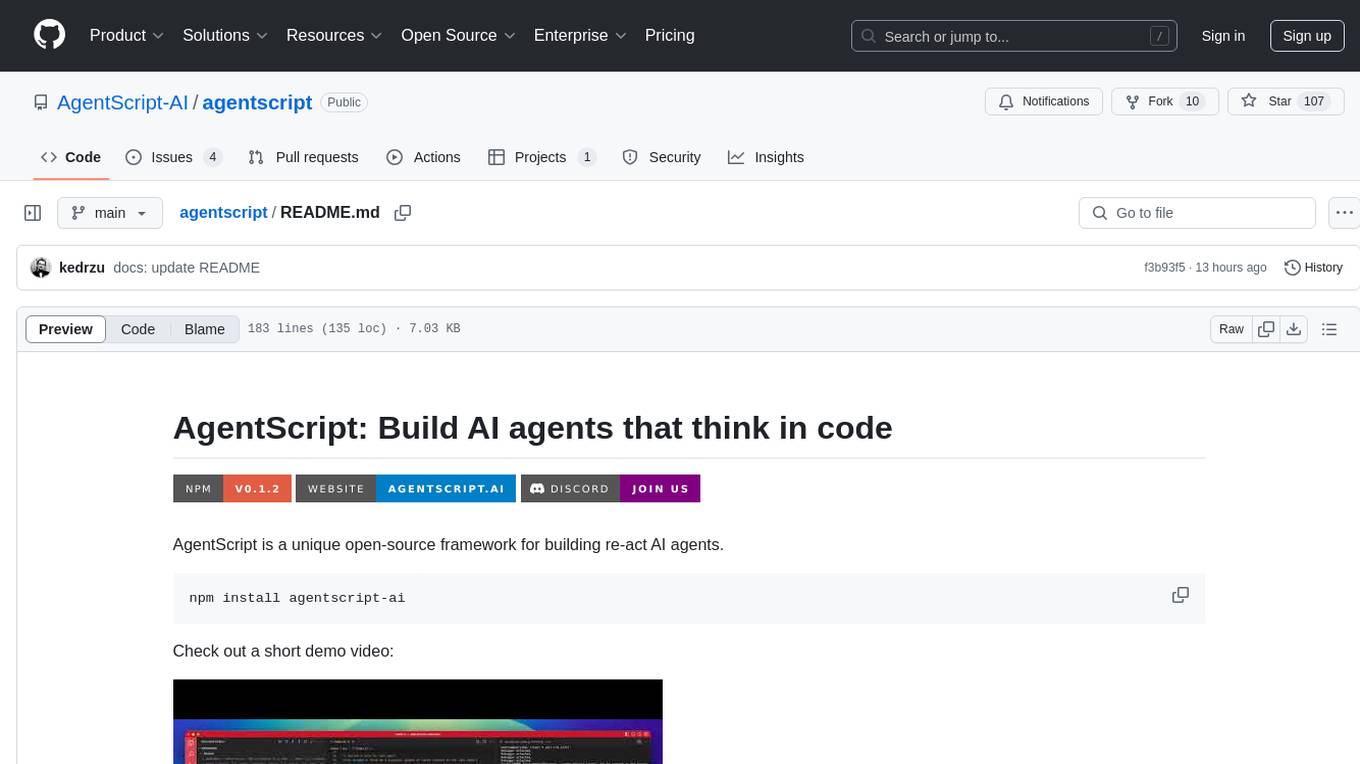
agentscript
AgentScript is an open-source framework for building AI agents that think in code. It prompts a language model to generate JavaScript code, which is then executed in a dedicated runtime with resumability, state persistence, and interactivity. The framework allows for abstract task execution without needing to know all the data beforehand, making it flexible and efficient. AgentScript supports tools, deterministic functions, and LLM-enabled functions, enabling dynamic data processing and decision-making. It also provides state management and human-in-the-loop capabilities, allowing for pausing, serialization, and resumption of execution.

Trace
Trace is a new AutoDiff-like tool for training AI systems end-to-end with general feedback. It generalizes the back-propagation algorithm by capturing and propagating an AI system's execution trace. Implemented as a PyTorch-like Python library, users can write Python code directly and use Trace primitives to optimize certain parts, similar to training neural networks.

onnxruntime-genai
ONNX Runtime Generative AI is a library that provides the generative AI loop for ONNX models, including inference with ONNX Runtime, logits processing, search and sampling, and KV cache management. Users can call a high level `generate()` method, or run each iteration of the model in a loop. It supports greedy/beam search and TopP, TopK sampling to generate token sequences, has built in logits processing like repetition penalties, and allows for easy custom scoring.
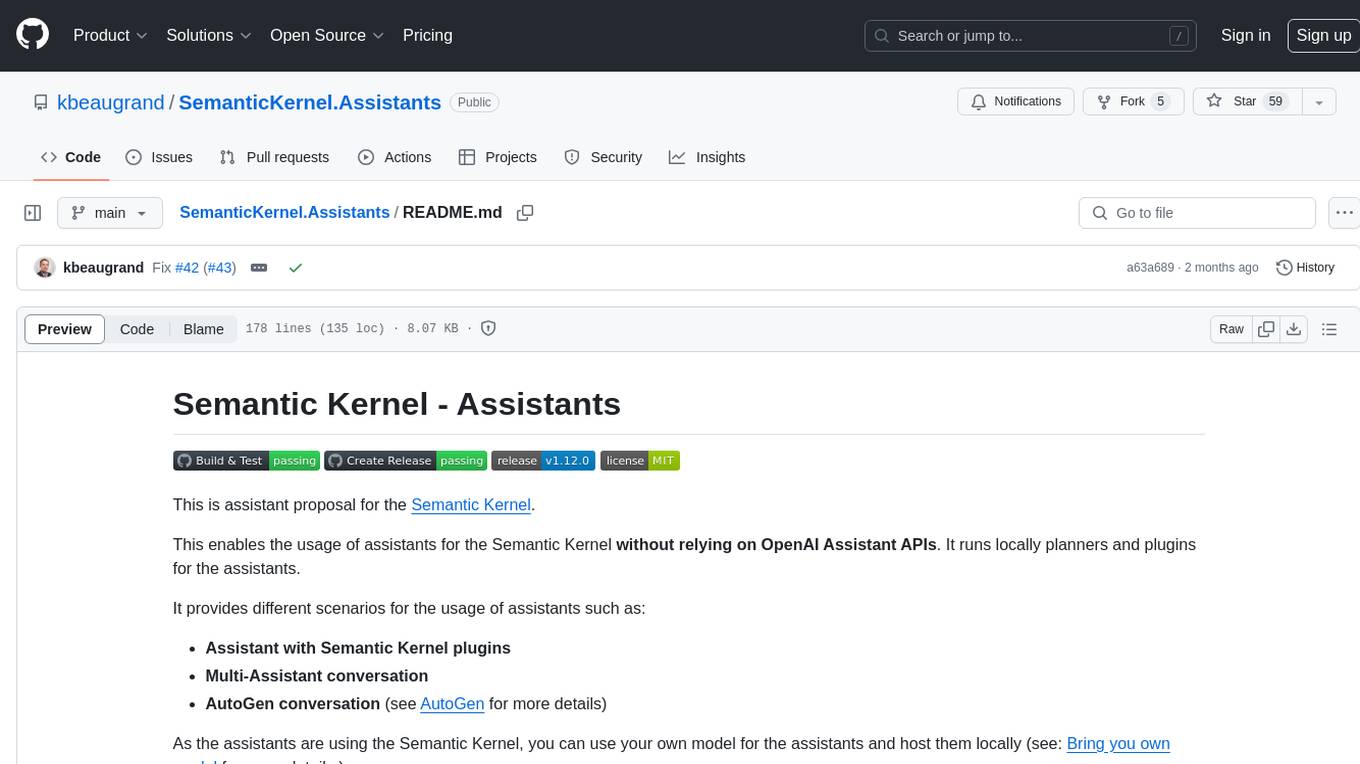
SemanticKernel.Assistants
This repository contains an assistant proposal for the Semantic Kernel, allowing the usage of assistants without relying on OpenAI Assistant APIs. It runs locally planners and plugins for the assistants, providing scenarios like Assistant with Semantic Kernel plugins, Multi-Assistant conversation, and AutoGen conversation. The Semantic Kernel is a lightweight SDK enabling integration of AI Large Language Models with conventional programming languages, offering functions like semantic functions, native functions, and embeddings-based memory. Users can bring their own model for the assistants and host them locally. The repository includes installation instructions, usage examples, and information on creating new conversation threads with the assistant.
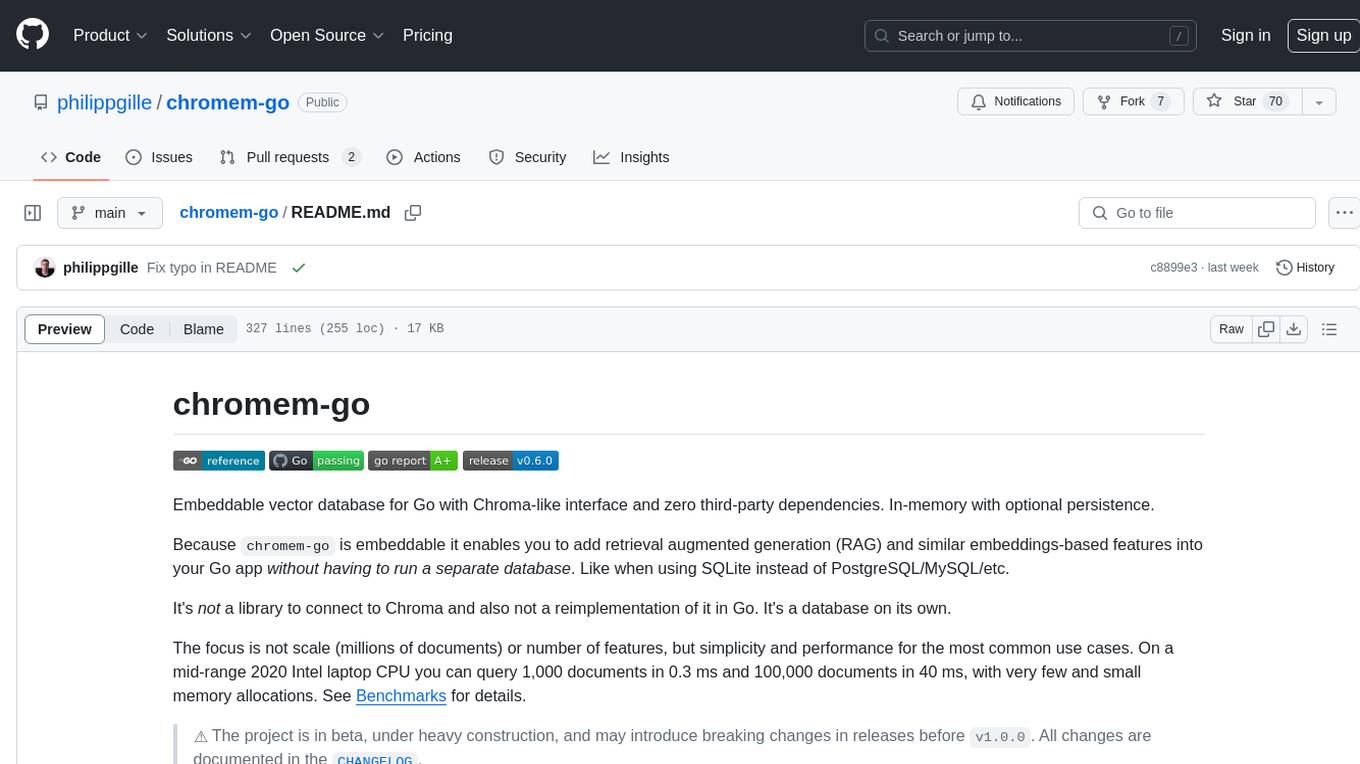
chromem-go
chromem-go is an embeddable vector database for Go with a Chroma-like interface and zero third-party dependencies. It enables retrieval augmented generation (RAG) and similar embeddings-based features in Go apps without the need for a separate database. The focus is on simplicity and performance for common use cases, allowing querying of documents with minimal memory allocations. The project is in beta and may introduce breaking changes before v1.0.0.
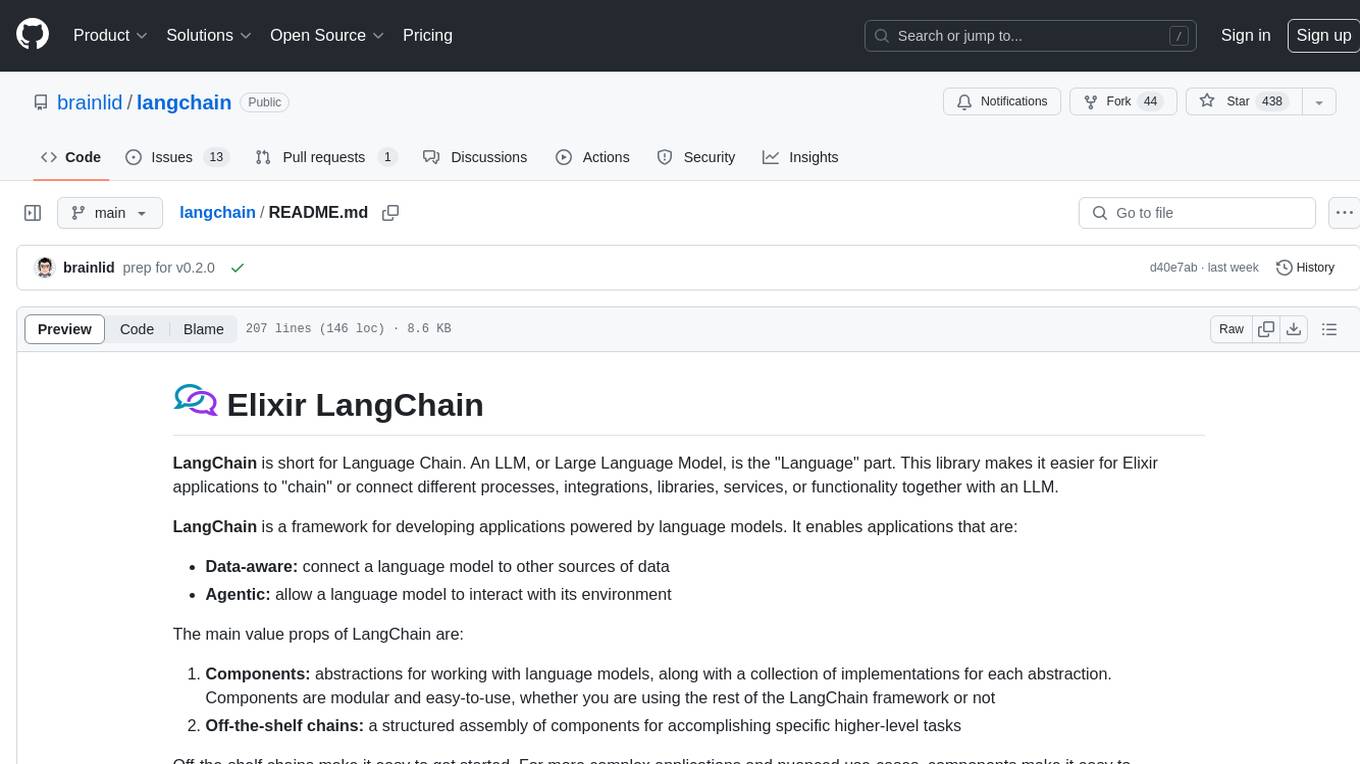
langchain
LangChain is a framework for developing Elixir applications powered by language models. It enables applications to connect language models to other data sources and interact with the environment. The library provides components for working with language models and off-the-shelf chains for specific tasks. It aims to assist in building applications that combine large language models with other sources of computation or knowledge. LangChain is written in Elixir and is not aimed for parity with the JavaScript and Python versions due to differences in programming paradigms and design choices. The library is designed to make it easy to integrate language models into applications and expose features, data, and functionality to the models.
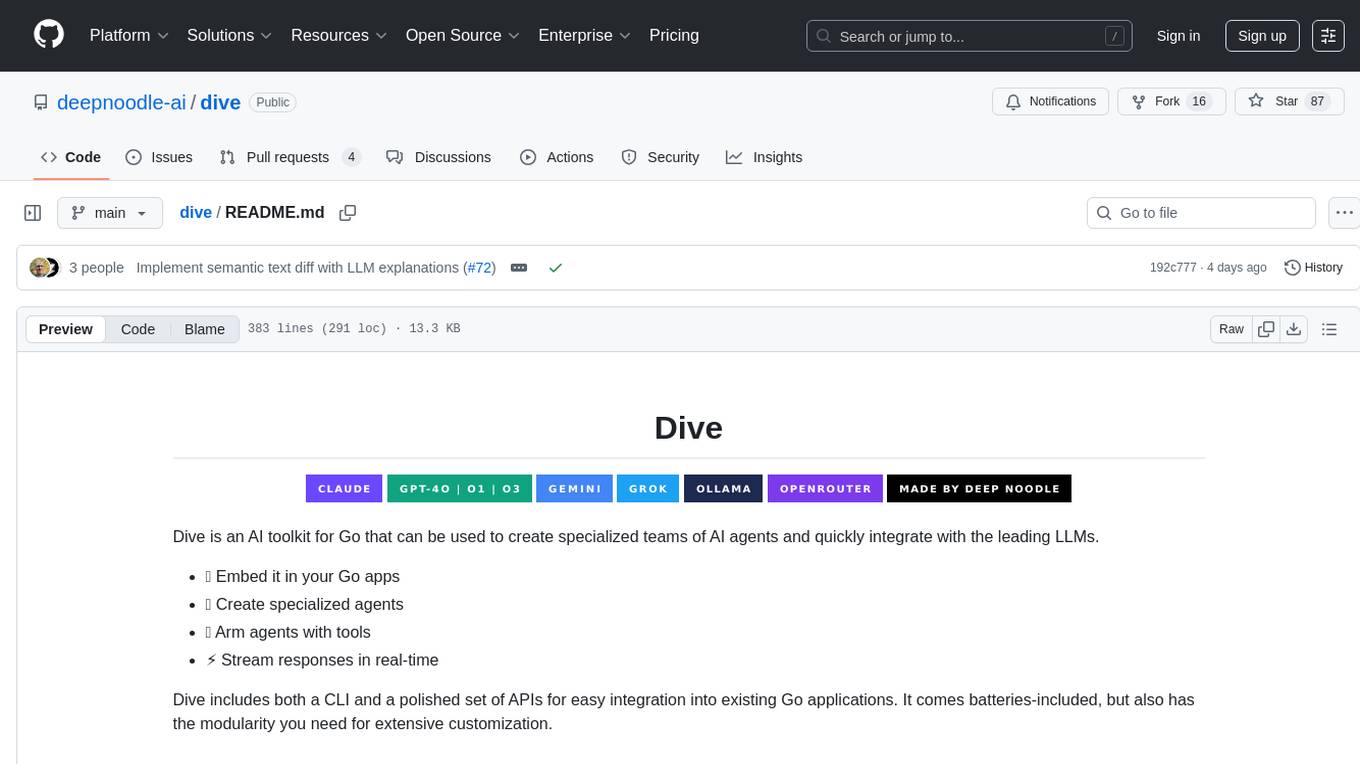
dive
Dive is an AI toolkit for Go that enables the creation of specialized teams of AI agents and seamless integration with leading LLMs. It offers a CLI and APIs for easy integration, with features like creating specialized agents, hierarchical agent systems, declarative configuration, multiple LLM support, extended reasoning, model context protocol, advanced model settings, tools for agent capabilities, tool annotations, streaming, CLI functionalities, thread management, confirmation system, deep research, and semantic diff. Dive also provides semantic diff analysis, unified interface for LLM providers, tool system with annotations, custom tool creation, and support for various verified models. The toolkit is designed for developers to build AI-powered applications with rich agent capabilities and tool integrations.
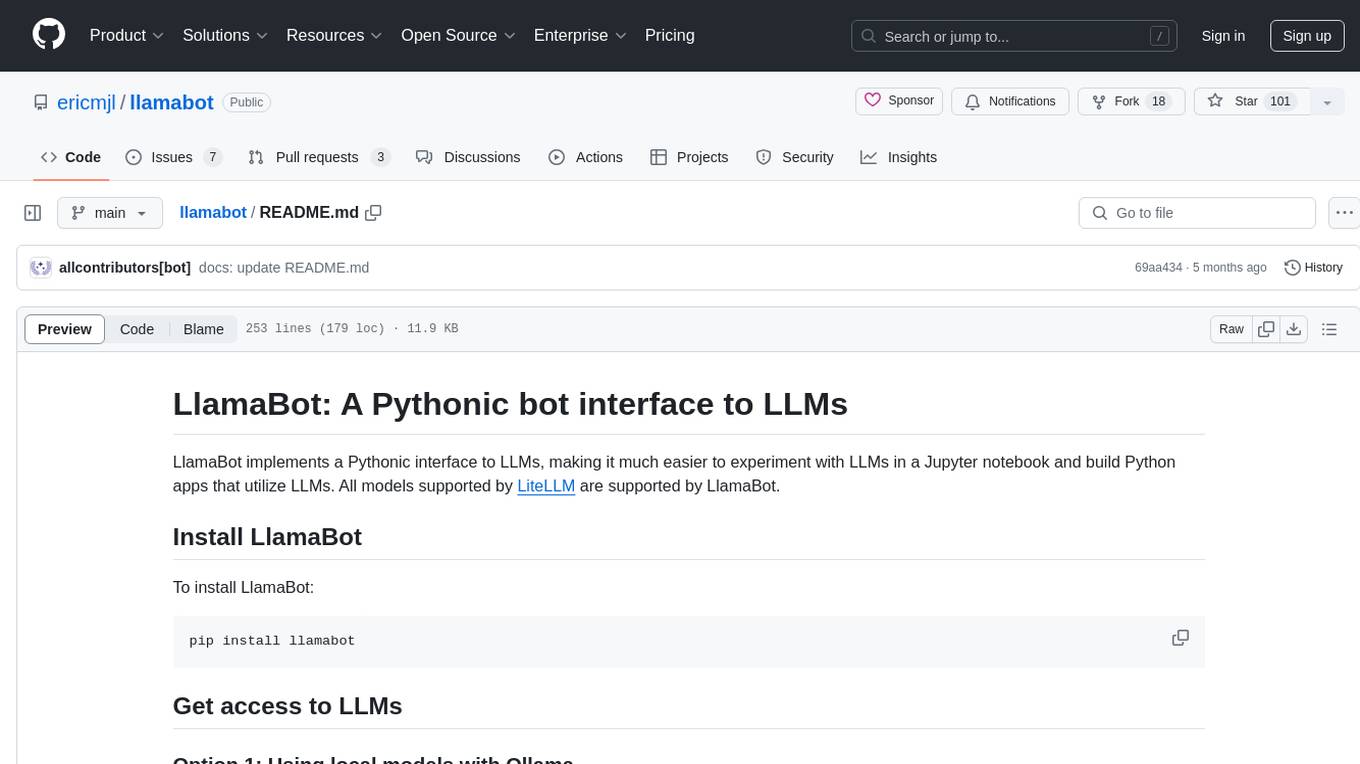
llamabot
LlamaBot is a Pythonic bot interface to Large Language Models (LLMs), providing an easy way to experiment with LLMs in Jupyter notebooks and build Python apps utilizing LLMs. It supports all models available in LiteLLM. Users can access LLMs either through local models with Ollama or by using API providers like OpenAI and Mistral. LlamaBot offers different bot interfaces like SimpleBot, ChatBot, QueryBot, and ImageBot for various tasks such as rephrasing text, maintaining chat history, querying documents, and generating images. The tool also includes CLI demos showcasing its capabilities and supports contributions for new features and bug reports from the community.
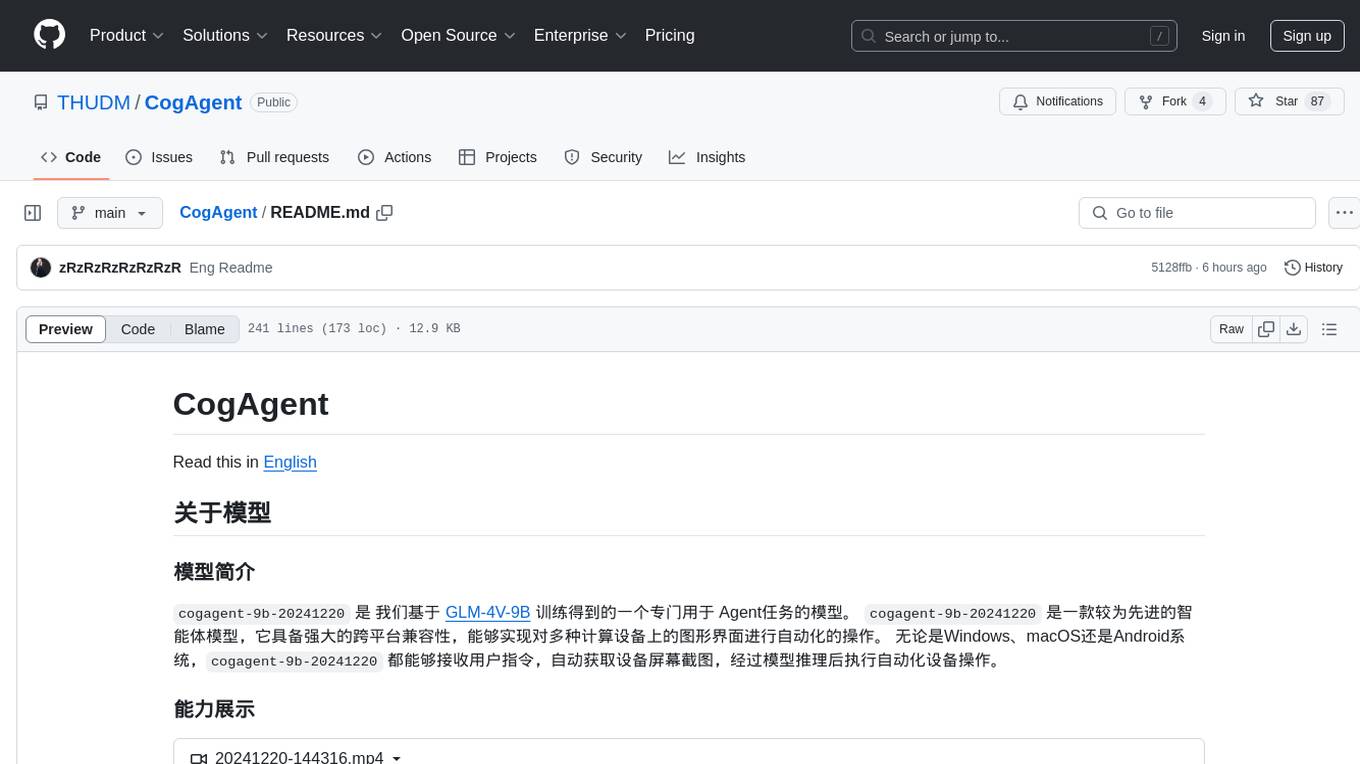
CogAgent
CogAgent is an advanced intelligent agent model designed for automating operations on graphical interfaces across various computing devices. It supports platforms like Windows, macOS, and Android, enabling users to issue commands, capture device screenshots, and perform automated operations. The model requires a minimum of 29GB of GPU memory for inference at BF16 precision and offers capabilities for executing tasks like sending Christmas greetings and sending emails. Users can interact with the model by providing task descriptions, platform specifications, and desired output formats.
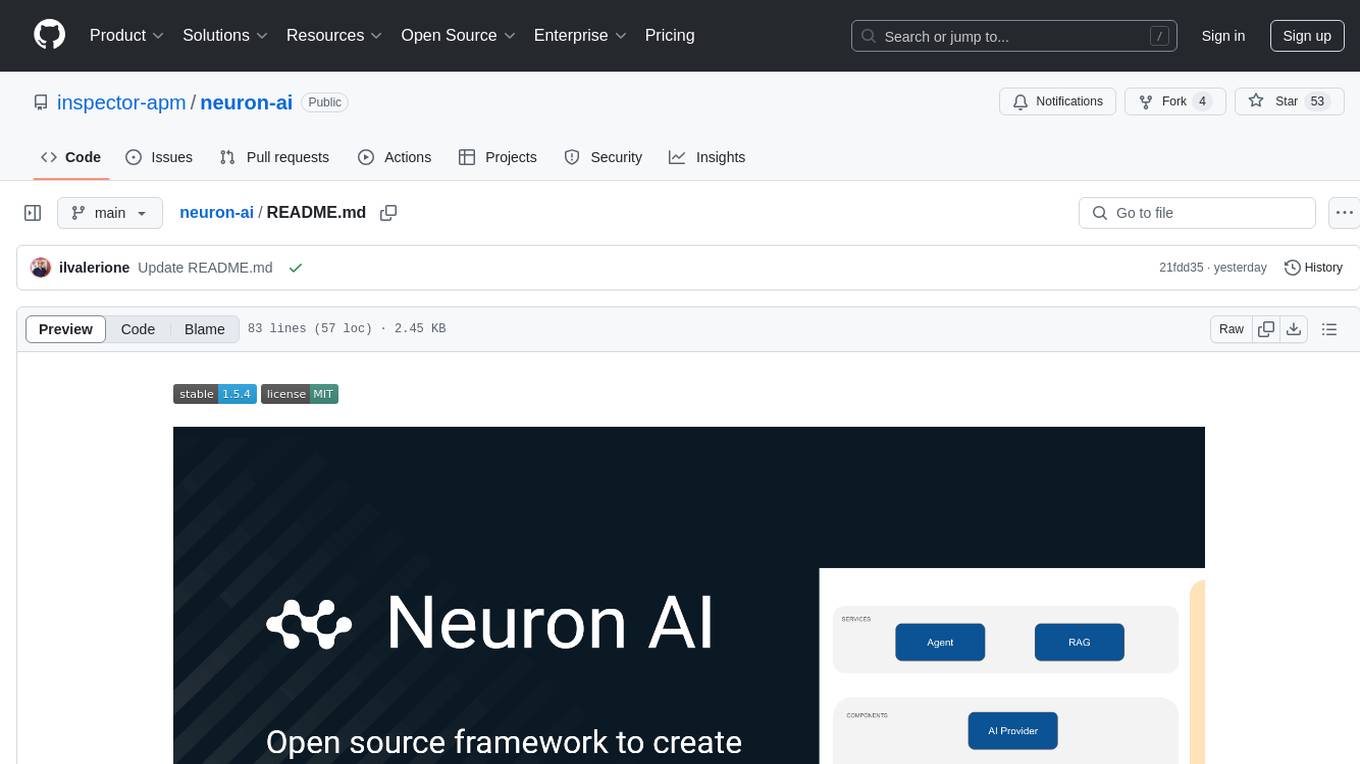
neuron-ai
Neuron AI is a PHP framework that provides an Agent class for creating fully functional agents to perform tasks like analyzing text for SEO optimization. The framework manages advanced mechanisms such as memory, tools, and function calls. Users can extend the Agent class to create custom agents and interact with them to get responses based on the underlying LLM. Neuron AI aims to simplify the development of AI-powered applications by offering a structured framework with documentation and guidelines for contributions under the MIT license.
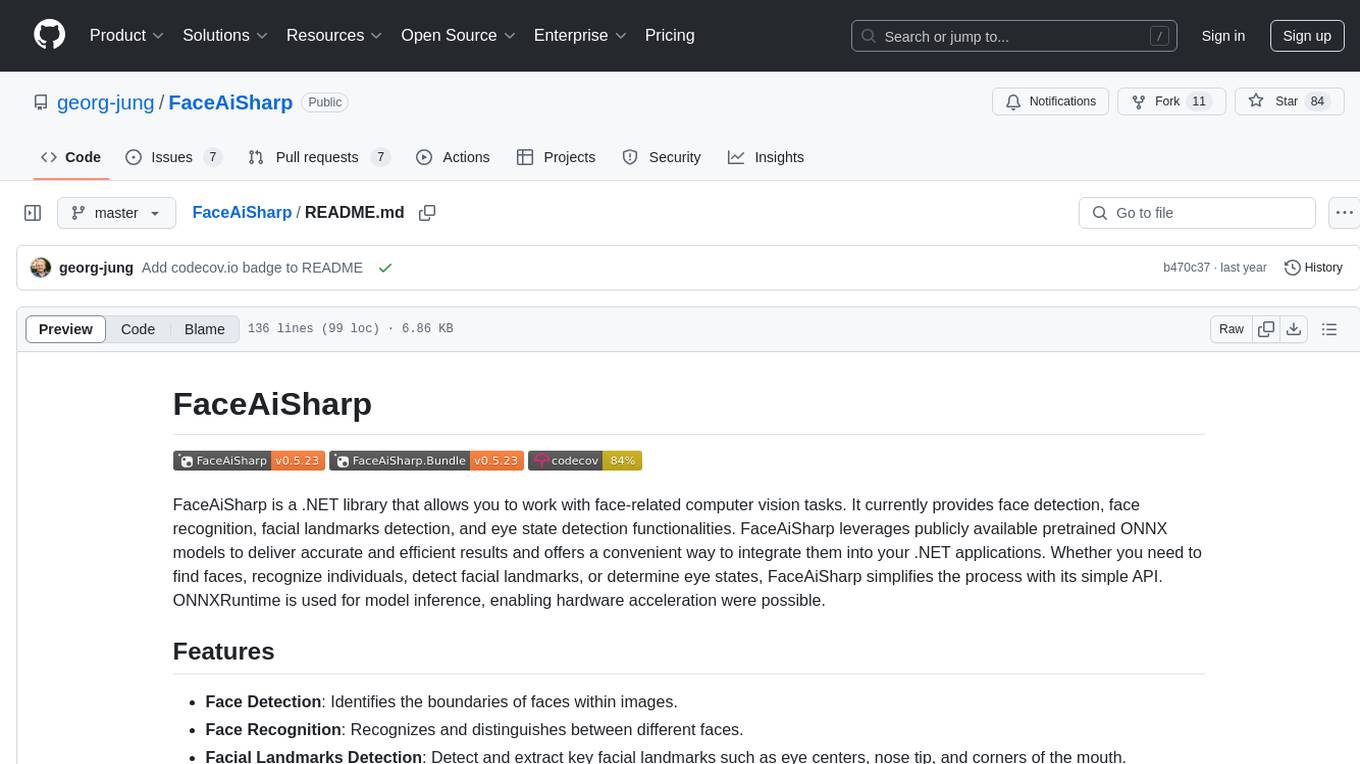
FaceAiSharp
FaceAiSharp is a .NET library designed for face-related computer vision tasks. It offers functionalities such as face detection, face recognition, facial landmarks detection, and eye state detection. The library utilizes pretrained ONNX models for accurate and efficient results, enabling users to integrate these capabilities into their .NET applications easily. With a focus on simplicity and performance, FaceAiSharp provides a local processing solution without relying on cloud services, supporting image-based face processing using ImageSharp. It is cross-platform compatible, supporting Windows, Linux, Android, and more.

resonance
Resonance is a framework designed to facilitate interoperability and messaging between services in your infrastructure and beyond. It provides AI capabilities and takes full advantage of asynchronous PHP, built on top of Swoole. With Resonance, you can: * Chat with Open-Source LLMs: Create prompt controllers to directly answer user's prompts. LLM takes care of determining user's intention, so you can focus on taking appropriate action. * Asynchronous Where it Matters: Respond asynchronously to incoming RPC or WebSocket messages (or both combined) with little overhead. You can set up all the asynchronous features using attributes. No elaborate configuration is needed. * Simple Things Remain Simple: Writing HTTP controllers is similar to how it's done in the synchronous code. Controllers have new exciting features that take advantage of the asynchronous environment. * Consistency is Key: You can keep the same approach to writing software no matter the size of your project. There are no growing central configuration files or service dependencies registries. Every relation between code modules is local to those modules. * Promises in PHP: Resonance provides a partial implementation of Promise/A+ spec to handle various asynchronous tasks. * GraphQL Out of the Box: You can build elaborate GraphQL schemas by using just the PHP attributes. Resonance takes care of reusing SQL queries and optimizing the resources' usage. All fields can be resolved asynchronously.
For similar tasks
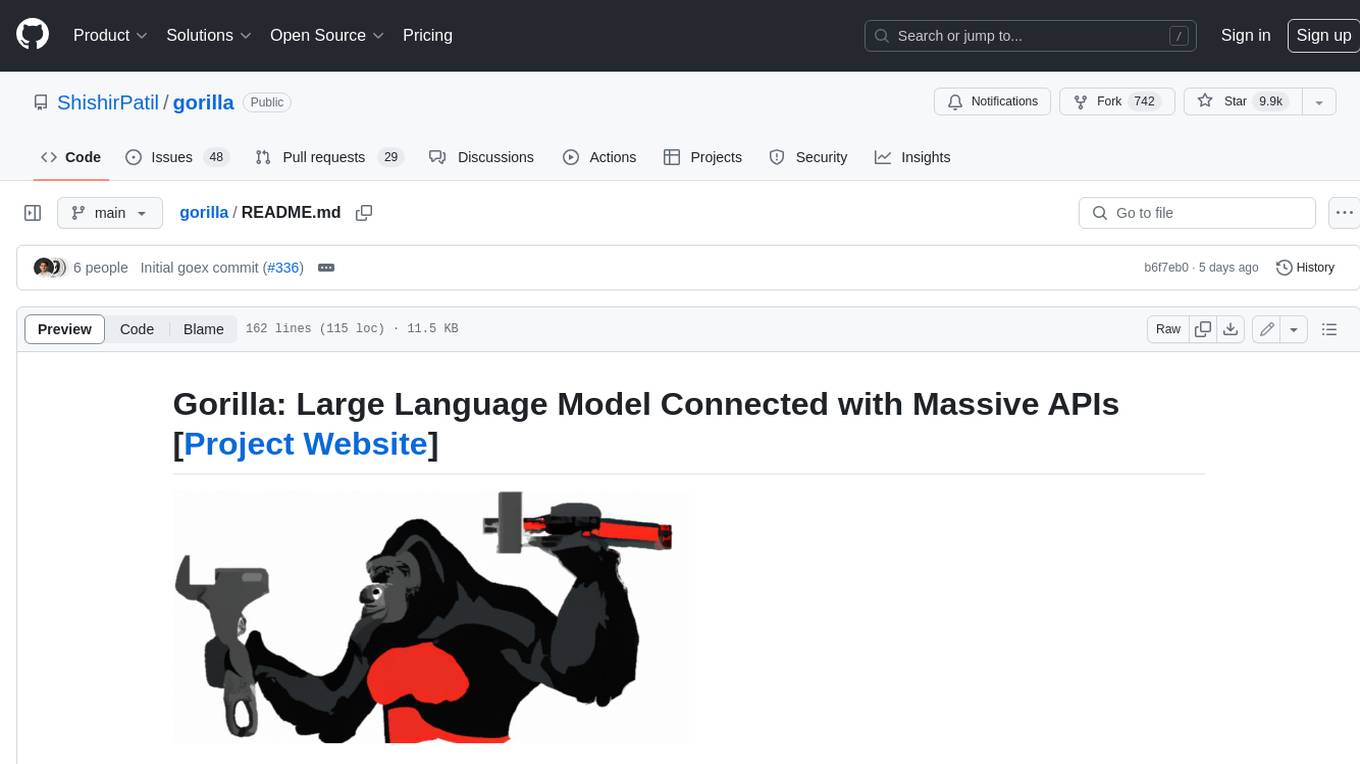
gorilla
Gorilla is a tool that enables LLMs to use tools by invoking APIs. Given a natural language query, Gorilla comes up with the semantically- and syntactically- correct API to invoke. With Gorilla, you can use LLMs to invoke 1,600+ (and growing) API calls accurately while reducing hallucination. Gorilla also releases APIBench, the largest collection of APIs, curated and easy to be trained on!
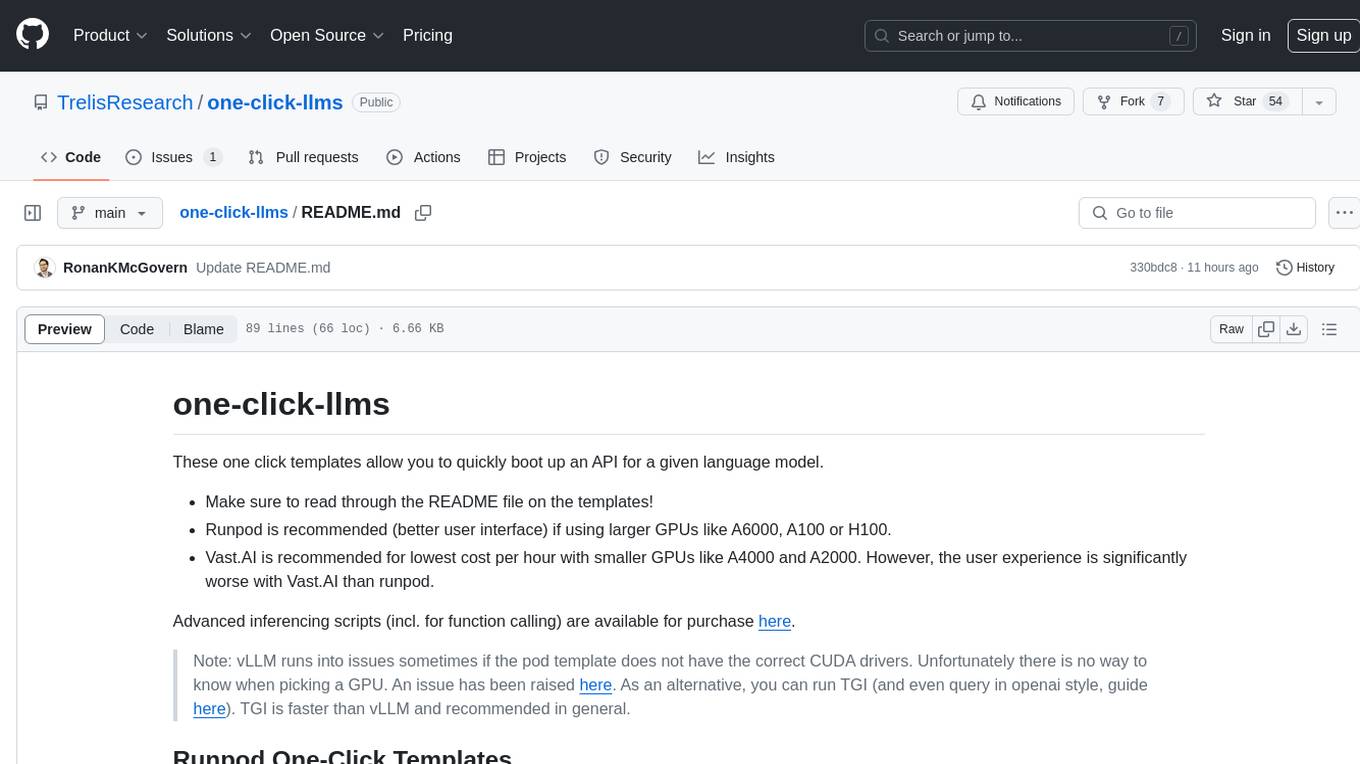
one-click-llms
The one-click-llms repository provides templates for quickly setting up an API for language models. It includes advanced inferencing scripts for function calling and offers various models for text generation and fine-tuning tasks. Users can choose between Runpod and Vast.AI for different GPU configurations, with recommendations for optimal performance. The repository also supports Trelis Research and offers templates for different model sizes and types, including multi-modal APIs and chat models.
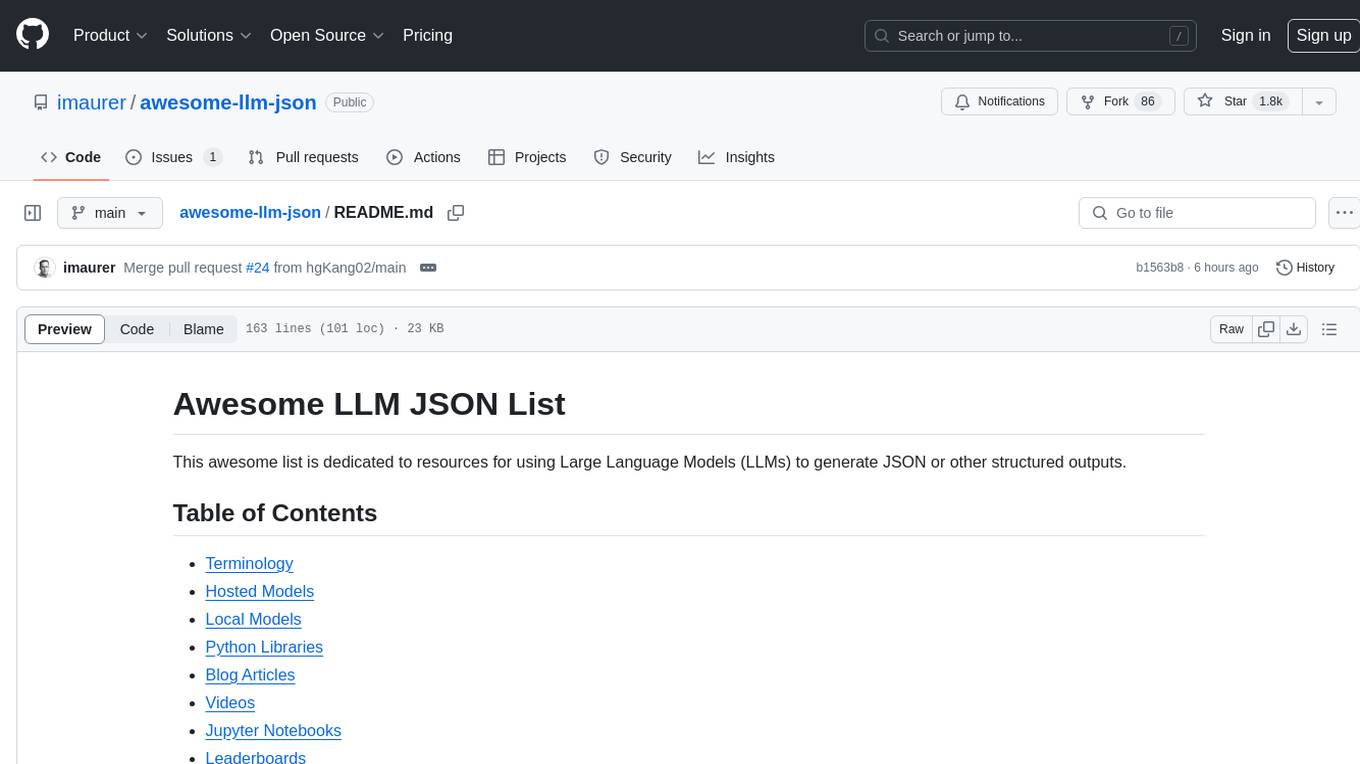
awesome-llm-json
This repository is an awesome list dedicated to resources for using Large Language Models (LLMs) to generate JSON or other structured outputs. It includes terminology explanations, hosted and local models, Python libraries, blog articles, videos, Jupyter notebooks, and leaderboards related to LLMs and JSON generation. The repository covers various aspects such as function calling, JSON mode, guided generation, and tool usage with different providers and models.
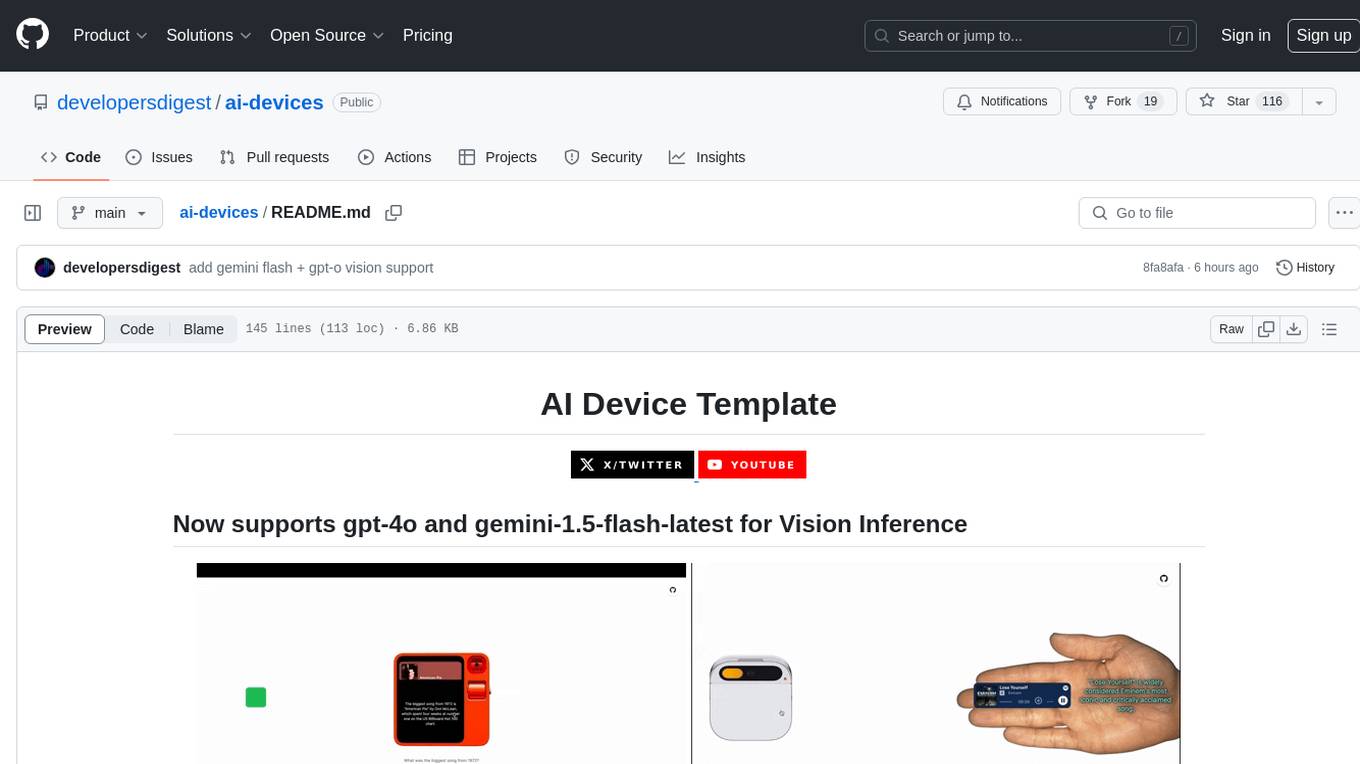
ai-devices
AI Devices Template is a project that serves as an AI-powered voice assistant utilizing various AI models and services to provide intelligent responses to user queries. It supports voice input, transcription, text-to-speech, image processing, and function calling with conditionally rendered UI components. The project includes customizable UI settings, optional rate limiting using Upstash, and optional tracing with Langchain's LangSmith for function execution. Users can clone the repository, install dependencies, add API keys, start the development server, and deploy the application. Configuration settings can be modified in `app/config.tsx` to adjust settings and configurations for the AI-powered voice assistant.
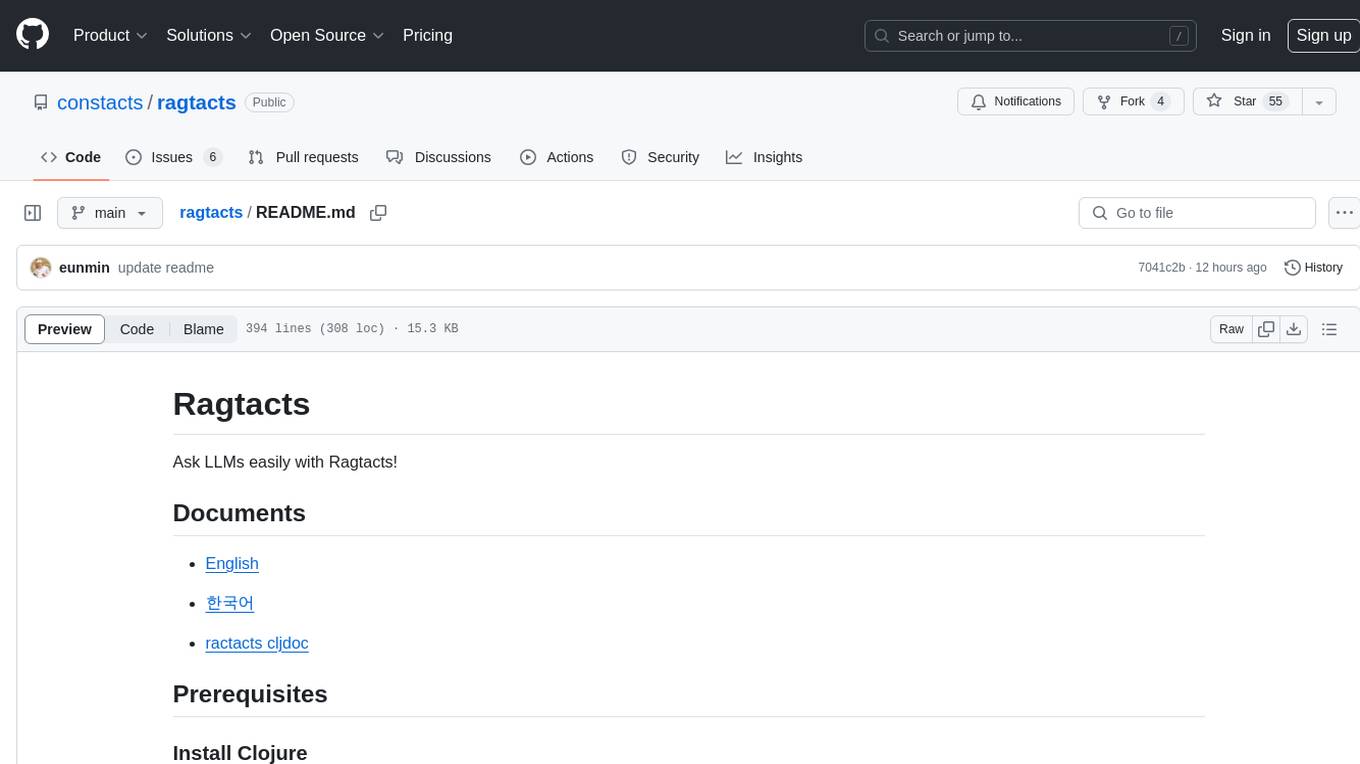
ragtacts
Ragtacts is a Clojure library that allows users to easily interact with Large Language Models (LLMs) such as OpenAI's GPT-4. Users can ask questions to LLMs, create question templates, call Clojure functions in natural language, and utilize vector databases for more accurate answers. Ragtacts also supports RAG (Retrieval-Augmented Generation) method for enhancing LLM output by incorporating external data. Users can use Ragtacts as a CLI tool, API server, or through a RAG Playground for interactive querying.

DelphiOpenAI
Delphi OpenAI API is an unofficial library providing Delphi implementation over OpenAI public API. It allows users to access various models, make completions, chat conversations, generate images, and call functions using OpenAI service. The library aims to facilitate tasks such as content generation, semantic search, and classification through AI models. Users can fine-tune models, work with natural language processing, and apply reinforcement learning methods for diverse applications.
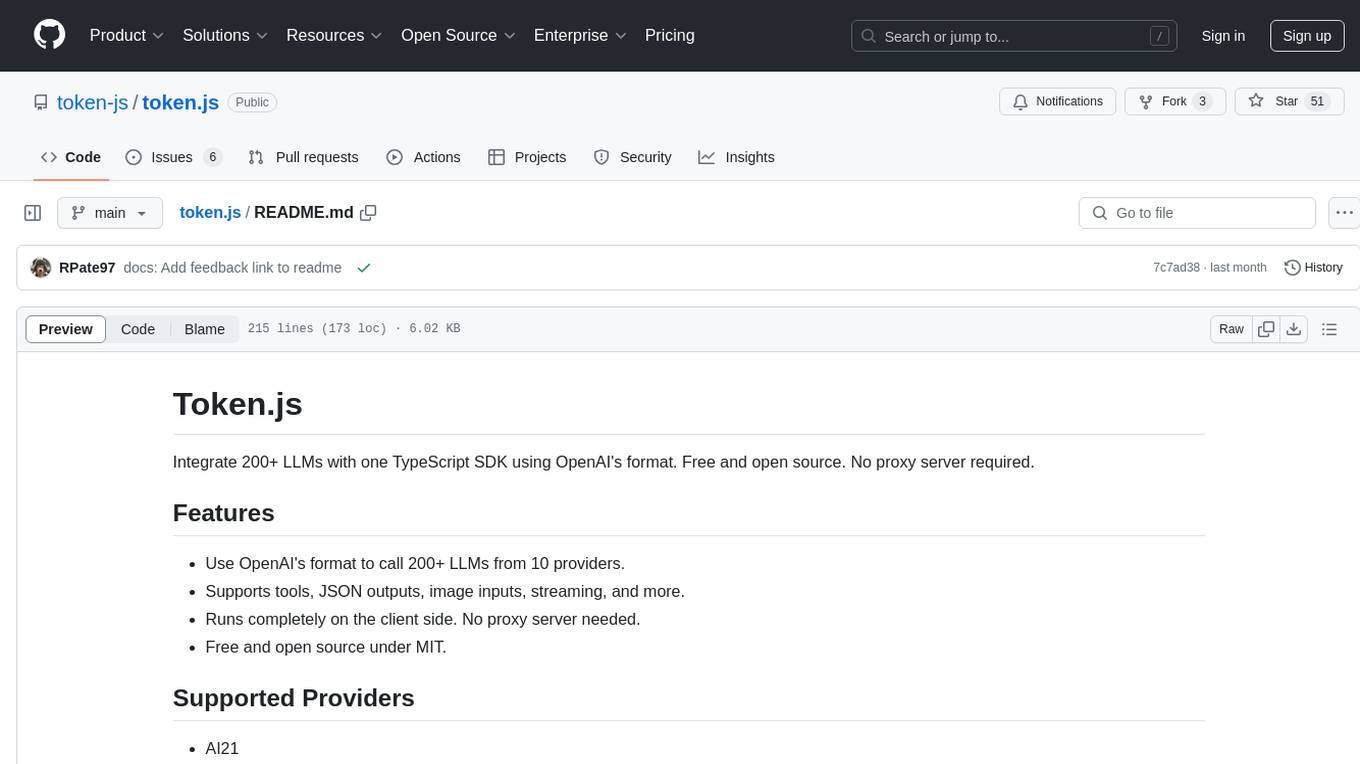
token.js
Token.js is a TypeScript SDK that integrates with over 200 LLMs from 10 providers using OpenAI's format. It allows users to call LLMs, supports tools, JSON outputs, image inputs, and streaming, all running on the client side without the need for a proxy server. The tool is free and open source under the MIT license.
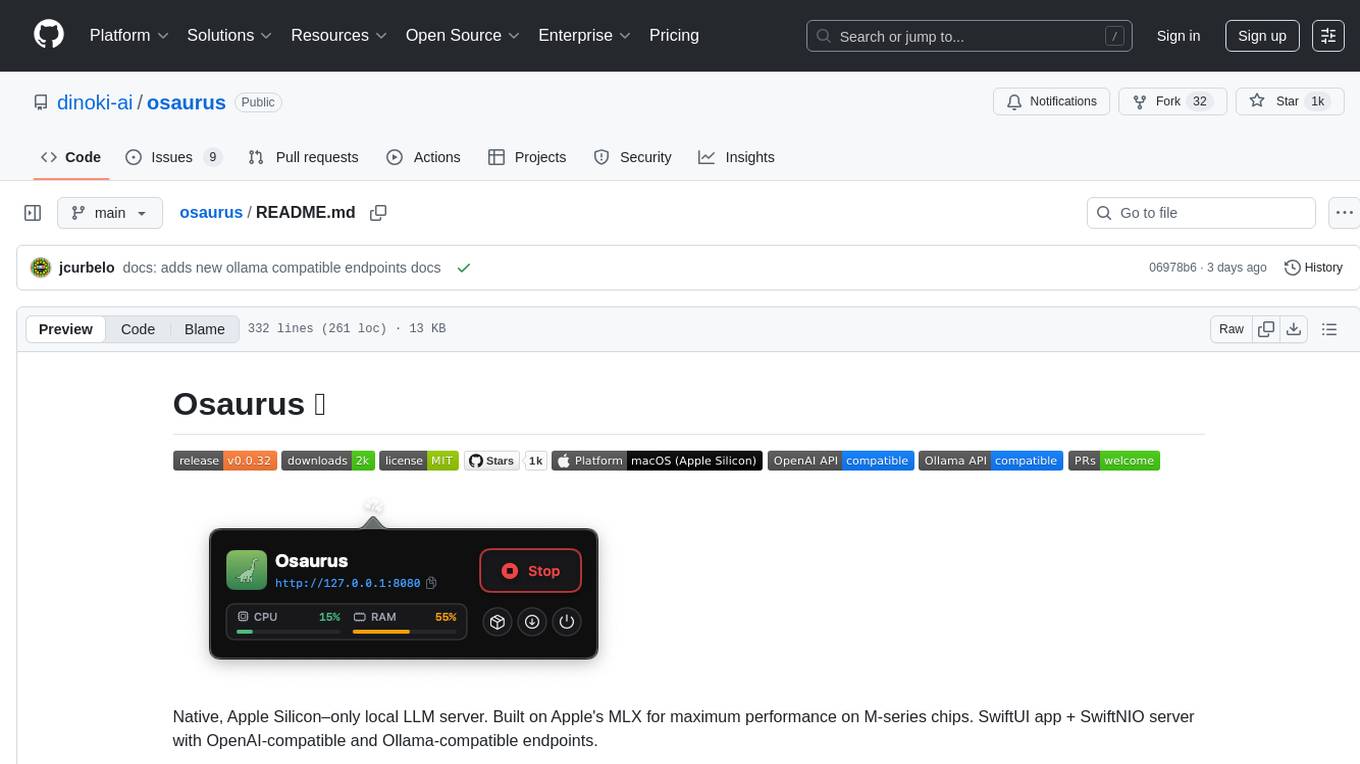
osaurus
Osaurus is a native, Apple Silicon-only local LLM server built on Apple's MLX for maximum performance on M‑series chips. It is a SwiftUI app + SwiftNIO server with OpenAI‑compatible and Ollama‑compatible endpoints. The tool supports native MLX text generation, model management, streaming and non‑streaming chat completions, OpenAI‑compatible function calling, real-time system resource monitoring, and path normalization for API compatibility. Osaurus is designed for macOS 15.5+ and Apple Silicon (M1 or newer) with Xcode 16.4+ required for building from source.
For similar jobs

promptflow
**Prompt flow** is a suite of development tools designed to streamline the end-to-end development cycle of LLM-based AI applications, from ideation, prototyping, testing, evaluation to production deployment and monitoring. It makes prompt engineering much easier and enables you to build LLM apps with production quality.

deepeval
DeepEval is a simple-to-use, open-source LLM evaluation framework specialized for unit testing LLM outputs. It incorporates various metrics such as G-Eval, hallucination, answer relevancy, RAGAS, etc., and runs locally on your machine for evaluation. It provides a wide range of ready-to-use evaluation metrics, allows for creating custom metrics, integrates with any CI/CD environment, and enables benchmarking LLMs on popular benchmarks. DeepEval is designed for evaluating RAG and fine-tuning applications, helping users optimize hyperparameters, prevent prompt drifting, and transition from OpenAI to hosting their own Llama2 with confidence.

MegaDetector
MegaDetector is an AI model that identifies animals, people, and vehicles in camera trap images (which also makes it useful for eliminating blank images). This model is trained on several million images from a variety of ecosystems. MegaDetector is just one of many tools that aims to make conservation biologists more efficient with AI. If you want to learn about other ways to use AI to accelerate camera trap workflows, check out our of the field, affectionately titled "Everything I know about machine learning and camera traps".

leapfrogai
LeapfrogAI is a self-hosted AI platform designed to be deployed in air-gapped resource-constrained environments. It brings sophisticated AI solutions to these environments by hosting all the necessary components of an AI stack, including vector databases, model backends, API, and UI. LeapfrogAI's API closely matches that of OpenAI, allowing tools built for OpenAI/ChatGPT to function seamlessly with a LeapfrogAI backend. It provides several backends for various use cases, including llama-cpp-python, whisper, text-embeddings, and vllm. LeapfrogAI leverages Chainguard's apko to harden base python images, ensuring the latest supported Python versions are used by the other components of the stack. The LeapfrogAI SDK provides a standard set of protobuffs and python utilities for implementing backends and gRPC. LeapfrogAI offers UI options for common use-cases like chat, summarization, and transcription. It can be deployed and run locally via UDS and Kubernetes, built out using Zarf packages. LeapfrogAI is supported by a community of users and contributors, including Defense Unicorns, Beast Code, Chainguard, Exovera, Hypergiant, Pulze, SOSi, United States Navy, United States Air Force, and United States Space Force.

llava-docker
This Docker image for LLaVA (Large Language and Vision Assistant) provides a convenient way to run LLaVA locally or on RunPod. LLaVA is a powerful AI tool that combines natural language processing and computer vision capabilities. With this Docker image, you can easily access LLaVA's functionalities for various tasks, including image captioning, visual question answering, text summarization, and more. The image comes pre-installed with LLaVA v1.2.0, Torch 2.1.2, xformers 0.0.23.post1, and other necessary dependencies. You can customize the model used by setting the MODEL environment variable. The image also includes a Jupyter Lab environment for interactive development and exploration. Overall, this Docker image offers a comprehensive and user-friendly platform for leveraging LLaVA's capabilities.

carrot
The 'carrot' repository on GitHub provides a list of free and user-friendly ChatGPT mirror sites for easy access. The repository includes sponsored sites offering various GPT models and services. Users can find and share sites, report errors, and access stable and recommended sites for ChatGPT usage. The repository also includes a detailed list of ChatGPT sites, their features, and accessibility options, making it a valuable resource for ChatGPT users seeking free and unlimited GPT services.

TrustLLM
TrustLLM is a comprehensive study of trustworthiness in LLMs, including principles for different dimensions of trustworthiness, established benchmark, evaluation, and analysis of trustworthiness for mainstream LLMs, and discussion of open challenges and future directions. Specifically, we first propose a set of principles for trustworthy LLMs that span eight different dimensions. Based on these principles, we further establish a benchmark across six dimensions including truthfulness, safety, fairness, robustness, privacy, and machine ethics. We then present a study evaluating 16 mainstream LLMs in TrustLLM, consisting of over 30 datasets. The document explains how to use the trustllm python package to help you assess the performance of your LLM in trustworthiness more quickly. For more details about TrustLLM, please refer to project website.

AI-YinMei
AI-YinMei is an AI virtual anchor Vtuber development tool (N card version). It supports fastgpt knowledge base chat dialogue, a complete set of solutions for LLM large language models: [fastgpt] + [one-api] + [Xinference], supports docking bilibili live broadcast barrage reply and entering live broadcast welcome speech, supports Microsoft edge-tts speech synthesis, supports Bert-VITS2 speech synthesis, supports GPT-SoVITS speech synthesis, supports expression control Vtuber Studio, supports painting stable-diffusion-webui output OBS live broadcast room, supports painting picture pornography public-NSFW-y-distinguish, supports search and image search service duckduckgo (requires magic Internet access), supports image search service Baidu image search (no magic Internet access), supports AI reply chat box [html plug-in], supports AI singing Auto-Convert-Music, supports playlist [html plug-in], supports dancing function, supports expression video playback, supports head touching action, supports gift smashing action, supports singing automatic start dancing function, chat and singing automatic cycle swing action, supports multi scene switching, background music switching, day and night automatic switching scene, supports open singing and painting, let AI automatically judge the content.







